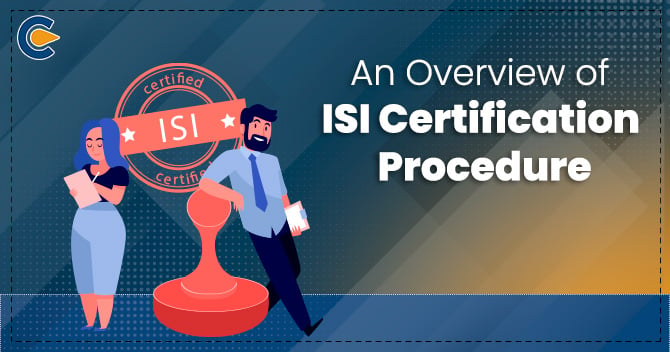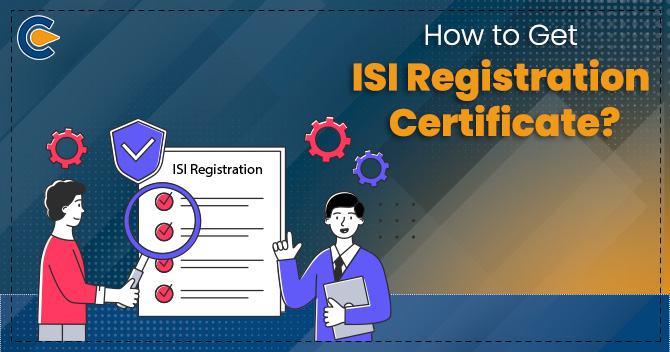In India, the Bureau of Indian Standards (BIS), is the national body for standardisation. BIS oversees standardisation activities as well as quality marking, quality assurance, and product certification, and other matters pertaining to these activities. Indian Standards Institute, also known as ISI, is a body entrusted with establishing the standards necessary for orderly business growth and the maintenance of high-quality industrial production. ISI mark certifies that a product complies with the ISI-prescribed Indian standards. ISI qualifications refers to the procedure for obtaining ISI Mark. Before they are sold in the market, an ISI label is required. This Certificate verifies the Quality and safety of an item or appliance. In this blog, we are going to discuss the ISI Certification Procedure
Important Considerations Regarding ISI Mark Certification in India
Every invoice must include information about the seller’s Certification by the ISI mark.
- If the consumer believes that the product’s Quality is unsatisfactory, they have the power to file a complaint with BIS.
- The BIS conducts routine inspections of all manufacturers.
Purpose of ISI Certification in India
- Make sure customers get high-quality products;
- Production costs can be reduced by cutting down on waste.
- Reducing product rejections;
- Boosting customer satisfaction and enhancing the company’s reputation
- Providing the company with enhanced growth prospects;
- The assurance of product quality and safety.
Benefits of ISI Certification
A manufacturer can avail of the following benefits after completing the ISI Certification Procedure:
- ISI certification assures consumers of a product’s superior Quality.
- A product with an ISI mark decreases product failure and business losses;
- In addition to providing better performance, ISI-marked products also have a longer shelf life.
- ISI-certified products are guaranteed to meet or exceed the customer’s expectations, and if they don’t, the company will replace the product.
- Having the ISI Mark on a product gives it a fresh lease on life in terms of standardisation, quality control, customer trust, and product security.
List of Products Which Require ISI Certification
BIS certification is discretionary in nature. Several products must comply with Indian Standards based on public interest, protection of human, animal, or plant health, environmental safety, prevention of unfair trade practices, and national security. For such products, the Central Government requires QCOs and a License or Certificate of Conformity (CoC) from BIS. ISI is the most recognised quality assurance mark in India.
- Cement
- Household Electrical Goods
- Food and Related Products
- Diesel Engines
- Oil Pressure Stove
- Automobile Accessories
- Cylinder accessories
- Medical equipment
- Steel Products
- Electric Transformers
Documents Required for ISI Certification Procedure
Following are some vital documents required for ISI Certification Procedure:
- Application Form V
- ISI Application Fee
- Copy of Test Report done within a month by internal laboratory
- Address Proof of the Manufacturing Unit
- Trade Mark Registration, if available
- Certificate from concerned regulatory agencies for manufacturing
- Drawing of the product
- Present Installed Capacity
- Raw Material Details
- Details of Machines
- Layout plan of the factory
- Details of Manufacturing Process
- Nature of packing
- Details of Test Equipment
- Details of QC (Quality Control) Staff
- Method of disposal of substandard product
- Organizational Chart of Factory
- Location Map of Factory.
Step by Step ISI Certification Procedure
Following are the two options for Indian Manufacturers to obtain ISI Certification:
- Normal ISI Certification Procedure: The process of giving a licence should be done within 120 days, unless it’s an all-India first case, in which case it could take 180 days, starting from the date the application is received, as long as the documentation, assessment of the unit, and product conformity are all found to be satisfactory at the first stage. The first step of the ISI Certification Procedure involves a manufacturing unit which is customised as per Indian standards. Then, an application form is filed, followed by payment of Audit Fees and Inspection Travel Expenses. After this step, a factory visit is done and Lab Test Report (LTR) is organized. Thereafter, Non-Conformity (if any) is resolved and the Official Fees are paid, if applicable. Finally, BIS (ISI) Certification is provided.
- Simplified ISI Certification Procedure: Within 30 days of receiving the application, if the factory visit is favourable and the sample conforms to the appropriate Indian Standard(s), the ISI Certification Procedure is expected to be completed. The first step involves manufacturing unit customization in accordance with applicable Indian Standard Sample Testing. Then, Application Form is to be submitted, followed by the payment of Audit Fees & Travel Expenses for the Factory Inspection Visit. Thereafter, Sample Submission for Testing is to be done. Finally, BIS ISI Certificate can be obtained, Closure of Non-Conformity is made (if any).
Validity and Renewal of ISI License
The initial duration of the license to use the Standard Mark (ISI) shall be at least one year and a maximum of two years. Applications with the necessary fees and supporting documentation under the current license may be submitted to extend the product varieties covered by the licence. By paying renewal fees and marking fees and providing a few supporting documents, a licence may be renewed for another five years.
Consumer complaints and wrong use of the ISI mark
- Consumers who have complaints about the Quality of the product bearing the ISI mark can take their concerns to the BIS office closest to them.
- If the grievance is valid, BIS will replace or repair the product as a resolution after receiving it.
- To avoid causing consumers any inconvenience, necessary steps are taken to make certain that negligent manufacturers adhere to corrective measures.
- If someone uses the ISI mark in violation of the BIS Act’s rules, they will be subject to the penalties outlined in Section 33 of the BIS Act[1]. Such a person may be sentenced to one year in prison or a fine of Rs. 50,000, or both.
Conclusion
After discussing the ISI Certification procedure, it is concluded that ISI Certification is important because this Certification abides to provide product quality assurance, increasing customer confidence and providing protection to their safety and health concerns. Because ISI Certificates are authorised by BIS in India, they are sometimes referred to as BIS Certificates.
Read our Article:Overview of the Benefits of ISI Certification











